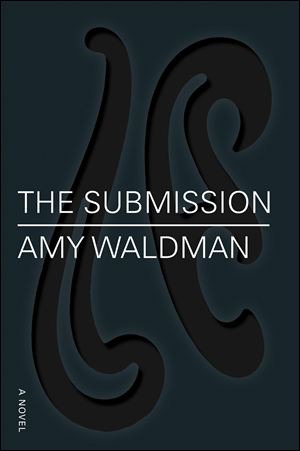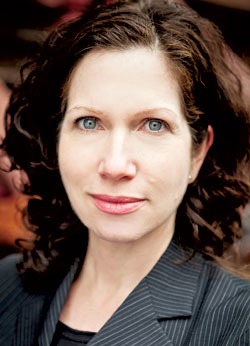Short Fuse Book Review: Admiring “The Submission”
The Submission has been compared to Richard Price’s richly evocative novels of New York life. It’s an apt comparison, though Amy Waldman brings a new cast of characters to bear, members of the Bangladeshi community.
The Submission by Amy Waldman. Farrar, Straus and Giroux, 320 pages, $26.
Mohammed Khan, aka Mo, the main character of Amy Waldman’s compelling novel, shares a trait with Herman Melville’s infuriatingly opaque creation, Bartleby the scrivener. Like Bartleby, Mohammed, at key times, prefers not to. But unlike Bartleby, a becalmed functionary in a bygone trade (a copyist), Mo, an up and coming Manhattan architect, is at the epicenter of a roiling conflict over the memorial to be placed at Ground Zero. His preference not to explain, placate, or assuage—combined with inherent inability to do so—exacerbates a city-wide conflict with global repercussions.
Khan has submitted what turns out to be the winning design for the Ground Zero memorial. He proposes a garden with real trees planted alongside inverted steel trees fashioned out of metal salvaged from the demolished towers. Canals crisscross the site. A raised platform for meditation is positioned at its center. The walls surrounding this six acre complex are inscribed with the names of those who died in the 9/11 attack.
As per protocol, Mo has submitted anonymously, on which basis his Garden is debated and evaluated by a panel consisting of curators, critics, and historians—art world heavies, to be sure, except for Claire Burwell, whose husband was killed in the attack and who is empanelled to speak for those who have suffered like loss. Ariana Montagu, formidable connoisseur, leads the opposition to the Garden. In the decisive meeting at Gracie Mansion, Ariana sniffs that “Gardens are fetishes of the European bourgeoisie.” She argues for something less beautiful with a more postmodern take on grief and votes for a design called the Void. There are rumors that the Void’s designer is Ariana’s pet protégé. That’s never established, but Waldman makes it clear from the outset that politics, patronage, and ambition are raw materials for The Submission.
Despite her lack of artworld credentials, Claire is not intimidated. “They saw for a living,” she muses about Ariana and the other aestheticians on the panel, “yet when it came to the Garden they wouldn’t see what she saw.” It doesn’t hurt Claire’s cause that, initially, she has the support of the other families, and that, tall and striking, she knows, as at the Gracie Mansion showdown, “how to outfit herself for maximum advantage.”
The Garden narrowly prevails, at which point its designer’s name is divulged to the panelists. “There were a few gasps and ‘hmmms,’ an ‘interesting,’ an ‘oh my.’ Then: ‘Jesus fucking Christ.’ It’s a goddamn Muslim!'”
But what kind of Muslim is Mohammed Khan?
Is he really just plain Mo, as his employers, colleagues, and lovers have known him? Lou Sarge the city’s right-wing radio jock has no doubt that Mohammed Khan is a god-damned Muslim—assuming there are any other kinds. Headlines in The New York Post, to which Khan’s name is leaked before the panel can fully come to terms with it, inflame the city. A New York Times art critic discerns, in the Garden, the subtle influence of “many high art forms produced by the Islamic world” and muses that these might encourage some people to think that “the designer is mocking us.”
The Times piece sends liberal Manhattanites to their therapists to work through “their discomfort with Mohammed Khan as the memorial designer.” Untherapized New Yorkers work through their discomfort by pulling headscarves off Muslim women and, in one case, committing murder. The families Claire was supposed to represent turn on her; for them, a Muslim commemorating Ground Zero is an invitation for the Islamic world to jeer at a wounded America.
Then there’s the media, a major factor in this novel, and its most pernicious element. The conflicts played out in The Submission are genuine enough, but the media twists, polarizes, and distorts them at every turn. Ambition, however venal, is one thing: Geraldine Bitman, for example, the Governor of New York, hopes that the high art of Muslim bashing, as she practices it, will take her to the White House. But if the point of media is to aid and abet communication, it plays the opposite role in this book, converting every utterance or action into a funhouse version of itself.
As for Khan, he is not mute a la Bartleby. It’s just that his efforts to be heard, to make sense of his situation, are so full of contrary or misinterpreted impulses as to cancel themselves out. Bartleby haunts the narrator of Melville’s story, filling him with a peculiar if unwanted sense of kinship and responsibility, drawing him at one point “irresistibly to gloom.” Khan haunts The Submission, but he’s hardly the only memorable character.
The Submission has been compared to Richard Price’s richly evocative novels of New York life. It’s an apt comparison, though Waldman brings a new cast of characters to bear, members of the Bangladeshi community. She gives one of them—the headscarf wearing Assam Anwar, whose husband, illegal immigrant that he was, died on 9/11—an unforgettable role. Waldman has also been compared to Thomas Wolfe, as per his challenge to novelists to write more like journalists. Waldman is a journalist, by trade, having reported, for example, for the Atlantic, on Muslim Americans tried and convicted on no more evidence than their problematic reading material (see “Prophetic Justice”, The Atlantic, October 2006). Her grasp of how complex it can be to be a Muslim in post-9/11 America buttresses The Submission.
This novel, Waldman’s first full-length fiction, is imperfect. There are bits of prose it would have been better off without. (A policeman, for example, presumably having drawn his gun, is described as having “unholstered his authority.”) But instances of cliche or overwriting are rare and trivial. My main reservation about The Submission pertains to its ending, in which the book flashes forward. “The country had moved on,” she writes about this more serene America, “self-corrected, as it always did, that feverish time mostly forgotten.”
In saying so, Waldman provides herself with a clean page on which to update key characters such as Claire and Khan. But she needn’t have wiped the slate quite so clean. Nor is it believable. The America I know, at any rate, does not automatically self correct, nor are its most feverish times so easily forgotten. So far as I can tell, this country is still fighting the Civil War, the War in Vietnam, not to mention the War in Afghanistan, and gives little indication that a few years down the road 9/11 will somehow cease to matter. That said, The Submission is, for the most part, so vivid, convincing, and relevant that I look forward to whatever Amy Waldman writes next.


